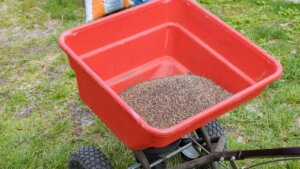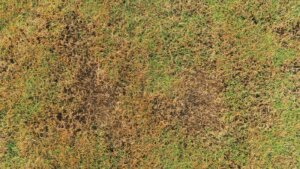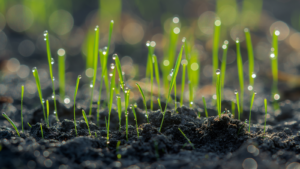Lawn care is essential to maintaining a beautiful home, but what happens when you apply too much fertilizer? Over-fertilizing your lawn can lead to many problems, including fertilizer burn, excess nitrogen, and even dead grass. In this article, we’ll explore how to fix an over-fertilized lawn and how to avoid over-fertilizing in the future.
Signs Your Lawn is Over-Fertilized
First, start with an understanding that not all lawns are the same, and the signs of over-fertilization can vary. However, some common indicators indicate you’ve gone overboard with your lawn fertilizer. Whether you mow your lawn frequently or not, these signs often manifest in your grass’s appearance and growth rate. Excessive application of elements like phosphorus and potassium, along with other components in the fertilizer, can lead to a layer of thatch and other issues. Below, we delve into the most telling signs that you’ve applied too much fertilizer to your lawn.
- Yellow or Brown Grass: One of the most apparent signs of an over-fertilized lawn is yellow or brown patches of dead grass.
- Fertilizer Burn: This is caused by excess nitrogen and salt in the soil, leading to a burnt appearance on the grass blades.
- Slow Growth: If your grass is growing very slowly or not at all, it may be a sign that you’ve over-fertilized your lawn.
How Fertilizer Affects Lawns
Understanding how fertilizer affects your lawn is crucial for effective lawn care. When you apply fertilizer, the goal is to enrich the soil with the nutrients your grass needs to thrive. However, not all fertilizers are created equal, and choosing the best lawn fertilizer is essential for avoiding the pitfalls of over-fertilization.
- Nutrient Imbalance: Too much nitrogen can lead to nutrient imbalances, affecting the overall health of your lawn.
- Soil Quality: Excess fertilizer can build up in the soil, affecting its quality and making it less hospitable for grass and plants.
- Watering Issues: Over-fertilizing can also affect how much water your lawn needs, leading to either over-watering or under-watering issues.
A fertilized lawn should show signs of healthy growth and vibrant color. But when you notice nutrient imbalances, poor soil quality, or water issues, it’s time to reassess how you fertilize your lawn. Over-fertilization can lead to a vicious cycle of lawn problems requiring significant effort and resources. Therefore, it’s crucial to understand the impact of fertilizer on your lawn to prevent these issues from arising in the first place.
How Much Fertilizer is Too Much?
Determining the right amount of fertilizer for your lawn can be a balancing act. You might wonder, “How often should I fertilize my lawn?” or “Do I need fertilizer for new grass?” While applying extra fertilizer for quicker results is tempting, doing so can burn your lawn and create more problems than solutions. Using less fertilizer can sometimes be more beneficial, especially for new grass still establishing its root system. Let’s delve into the factors that can help you gauge how much fertilizer is too much.
- Amount of Fertilizer: The right amount of fertilizer varies depending on lawn size, grass type, and soil quality.
- Type of Fertilizer: Granular fertilizers and slow-release fertilizers have different application rates. Always read the label to apply the right amount.
- Frequency: Fertilizing too often can lead to over-fertilization. Lawn care programs often recommend fertilizing only a few times a year.
Steps to Fix an Over-Fertilized Lawn
If you’ve realized that you’ve gone overboard regarding fertilizer, don’t worry—it’s not too late to correct the issue. Over-fertilizing a lawn is a common mistake, but the good news is that you can take steps to mitigate the damage. Whether you’re a DIY enthusiast or rely on a lawn service, understanding your lawn and how to fix it is crucial. In the following sections, we’ll guide you through the essential steps to recover from over-fertilizing and return your lawn to its former glory.
- Watering: One of the first steps to fix an over-fertilized lawn is to water it thoroughly to wash away the excess fertilizer.
- Raking: Use a rake to remove any clumps of fertilizer on the soil.
- Reseeding: In extreme cases, you may need to reseed patches of dead grass to encourage new growth.
How to Avoid Over-Fertilizing Your Lawn
The adage “better safe than sorry” couldn’t be more accurate regarding lawn care. While fertilizer is essential for keeping your grass green and encouraging grass to grow, too much of a good thing can have detrimental effects. Over-fertilizing can hinder your lawn’s ability to bounce back from stress and even kill the grass altogether. So, before you reach for that fertilizer bag, let’s explore some preventative measures to ensure you’re nourishing your lawn without overdoing it.
- Soil Testing: Before fertilizing your lawn, conduct a soil test to determine what nutrients your soil needs.
- Measure Properly: Always measure the fertilizer you need based on your lawn size.
- Follow Guidelines: Lawn care companies often provide guidelines on how much and how often to fertilize. Stick to these to avoid over-fertilizing.
Can You Over-Fertilize Your Lawn? Key Takeaways
Over-fertilizing your lawn can lead to many problems, from brown or yellow patches and fertilizer burn to even dead grass. It’s essential to know what your fertilizer contains and how it will affect your lawn after application. Proper watering and responsible grass clipping management can also significantly affect your lawn’s health. Feeding your lawn should be well-thought-out, backed by soil tests and expert guidelines.
Key Points:
- Over-fertilizing can lead to discolored grass, signaled by brown or yellow patches.
- Always check what nutrients your fertilizer contains before application.
- Proper watering is crucial, especially after fertilizing your lawn.
- Be mindful of how you manage grass clippings; they can affect your lawn’s health.
- It’s always a good idea to consult a lawn care expert for personalized advice when in doubt.
With the right knowledge and practices, you can avoid the pitfalls of over-fertilization and maintain a lush, green lawn. If you’re ever unsure, don’t hesitate to seek expert advice from Terra Lawn Care, and explore our lawn fertilization services for tailored solutions.






